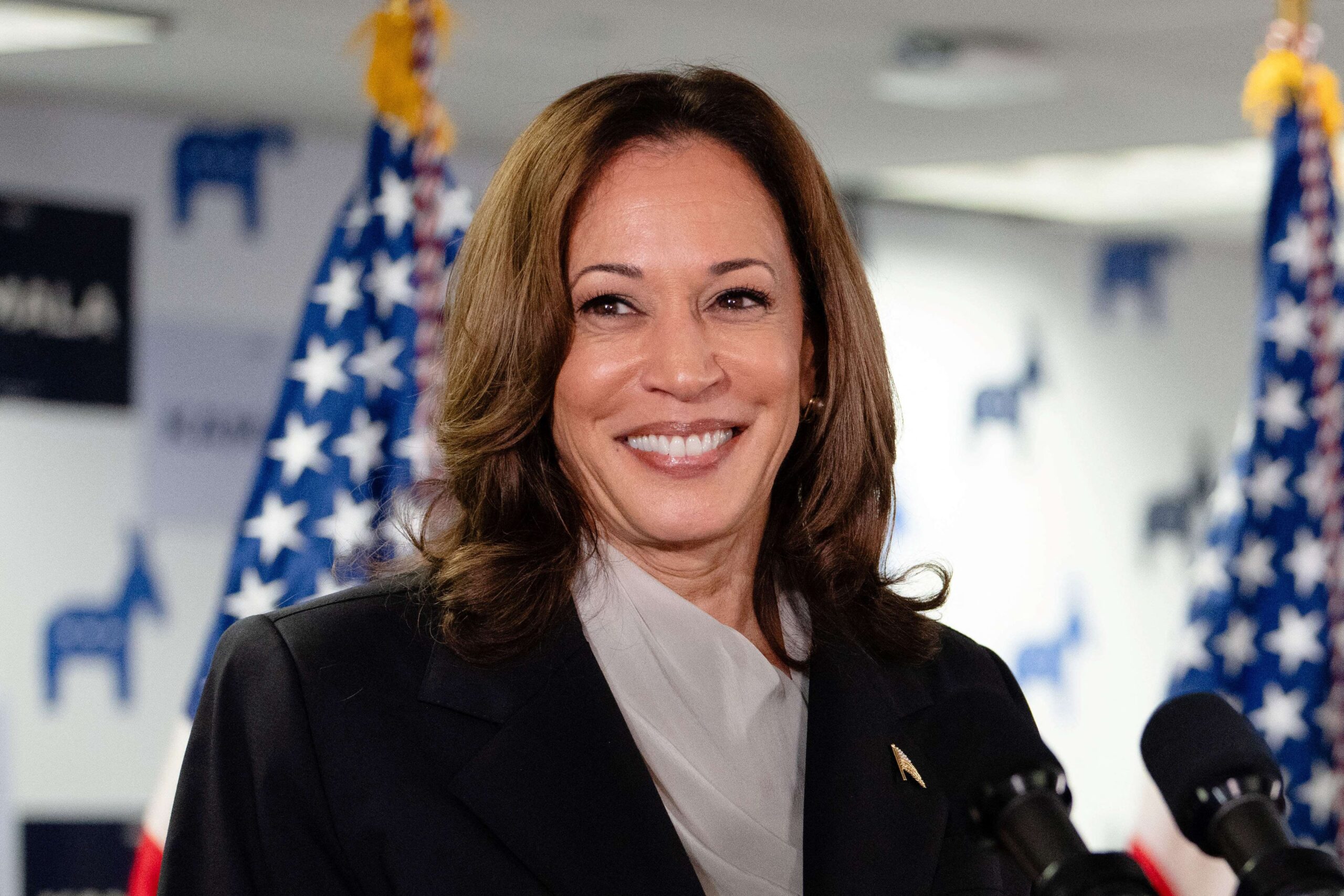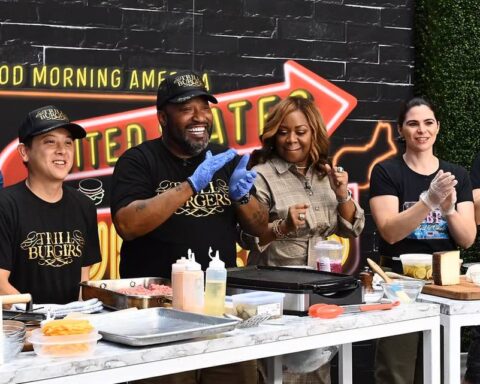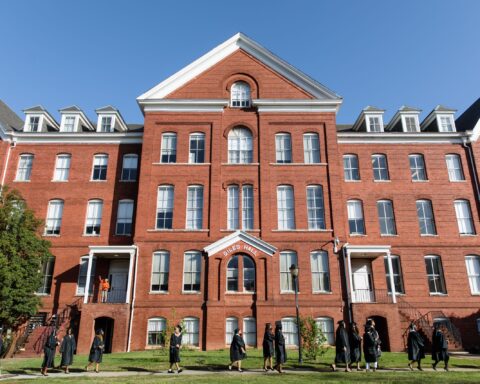By Niquel Terry Ellis
Jotaka Eaddy was sitting on her parents’ porch in South Carolina on Sunday afternoon when she got a text from an activist friend with a link to President Joe Biden’s letter announcing he was dropping out of the 2024 presidential race.
Eaddy said she started texting in a group chat with other Black women political organizers, where she learned that Biden was endorsing Vice President Kamala Harris for president.
Eaddy, founder of the grassroots group Win With Black Women, immediately jumped into organizing mode. If Harris had a chance to become the nation’s first Black female president, Eaddy said, she wanted to do her part to support her.
“It was time to go to work,” Eaddy said. “It was clear that it was time to turn it up 10 times.”
The women in Eaddy’s group chat started discussing how they could mobilize as many Black women as possible around Harris, she said. They agreed to spend the next five hours spreading the word about their weekly Sunday night Zoom call.
That call ended up attracting some 44,000 attendees — with 50,000 more listening on other platforms when Zoom reached capacity. It raised $1.5 million for Harris’ campaign, Eaddy said.
The call, activists say, was the start of a brewing movement of Black women who are quickly joining forces to help Harris secure a historic win in November. Thousands of Black women organizers across the country are mapping out voter registration efforts and planning conference calls, campaign events and fundraisers. Harris’ sorority, Alpha Kappa Alpha Sorority, Inc., announced Monday it was partnering with other Black Greek letter organizations to launch a massive nonpartisan voter mobilization campaign.
These types of collective efforts have helped Democrats win previous elections, and many Black female organizers believe they can do it again.
Black women are the most loyal voting bloc of the Democratic Party, with 90% supporting Biden in 2020.
Harris herself has been working to reach Black women voters with stops at Black sorority conventions in recent weeks. Earlier this month, prior to Biden dropping out the race, she spoke at the AKA Boule in Dallas. And on Wednesday she delivered remarks at the Zeta Phi Beta Sorority Inc. conference in Indianapolis.
Both AKA and Zeta Phi Beta are part of the National Pan-Hellenic Council, commonly called the Divine Nine, which is made up of nine Black sororities and fraternities. AKA has more than 360,000 members and Zeta Phi Beta has more than 125,000.
“There is so much at stake in this moment,” Harris said in her speech at the Zeta Phi Beta conference. “Our nation, as it always has, is counting on you to energize, to organize and to mobilize, to register folks to vote, to get them to the polls and to continue to fight for the future our nation and her people deserve.”
‘A symbol of breaking barriers’
While many Black women were ready to support Biden’s reelection bid, the news that Harris would likely replace Biden at the top of the Democratic ticket energized a lot of Black female voters, said Shavon Arline-Bradley, president of the National Council of Negro Women.
Arline-Bradley said Black women were excited to have a candidate they could identify with and one they believe will fight for the issues they care about such as health care, education and economic development.
“To see a person who represents your community, that looks like you, has the lived experiences that you’ve had, an HBCU grad, Divine Nine member, you have someone who is in church on Sunday with her family,” Arline-Bradley said. “These are Black women values.”
Harris is an alumna of Howard University, a historically Black institution.
Several prominent lawmakers and activists said they attended Sunday’s Win With Black Women call and pledged to join the movement coalescing around Harris.
Among them was Texas Democratic Rep. Jasmine Crockett, who said in a statement to CNN that Black women would be crucial to a Harris victory over former President Donald Trump.
Crockett said Harris is “qualified, capable, and fit to lead this country as our next President.”
“Black women have been strong supporters, seeing her as a symbol of breaking barriers and pushing for more diversity in leadership,” Crockett said. “Her leadership isn’t just about her achievements; it’s about what she represents: progress, equality, and opportunity for all.”
Activist Tamika Mallory told CNN that while Black women are celebrating Harris’ presidential bid, many are hoping that in return she will address the issues they care about.
Some of those top concerns include inflation, the need for higher-paying jobs, police brutality and a ceasefire in Gaza.
“The euphoria of the moment will pass,” Mallory said. “And then we have to get down to the business of a commitment from Kamala Harris to adopt the goals of our movement. There is work that has to be done. People in communities across the country are suffering.”
Challenges that lie ahead
Political experts and organizers acknowledged Harris’ path to victory would not be easy.
According to a CNN poll conducted by SSRS released Wednesday, Trump holds 49% support among registered voters nationwide to Harris’ 46%, a finding within the poll’s margin of sampling error.
Trump and other Republicans have already made race- and gender-based attacks on Harris.
Tennessee Republican Rep. Tim Burchett suggested in an interview with CNN’s Manu Raju that Harris was a “DEI hire” whom Biden chose solely because she is a Black woman. And in a Fox News interview, Trump’s running mate, Ohio Sen. JD Vance, took a jab at Harris for not having children, saying the country is being run by “childless cat ladies.”
In an interview with CNN’s Jim Acosta, former Atlanta Mayor Keisha Lance Bottoms called the attacks on Harris “absolutely ridiculous.”
“I’m not sure what the campaign strategy is when your intent is to offend everyone but straight white men,” Bottoms said.
Eaddy said Black women are expecting this form of “dog whistle politics” and are prepared to defend Harris.
“We are going to call out the platforms that give space to racism and sexism and we are going to shut it down,” Eaddy said.
Andra Gillespie, a political scientist at Emory University, said Harris also will face the challenge of winning over voters who supported Biden in 2020 but aren’t satisfied with his record.
Between July 1 and July 21, national polls showed Biden had an average approval rating of 37%, with 58% of respondents disapproving.
“If people are unhappy about how Biden has handled policy, she (Harris) is going to be held responsible,” Gillespie said. “She has to craft a message to figure out how to combat that.”
But Eaddy said she believes the Biden-Harris administration’s investment in HBCUs and small businesses; its success capping insulin prices for more Americans; and its advocacy for Black maternal health has helped maintain the support of most Black voters.
She said she expects Black women will have a significant impact on voter turnout in November.
“When we go to polls, we don’t just take ourselves,” Eaddy said. “We take our households, we take our communities, we take our churches, we take our sororities, we take our community groups, we take our brothers, we take our sons. That’s what we have seen and what will continue to see.”







